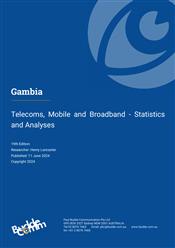Gambia Telecoms Market Report
Telecoms, Mobile and Broadband - Statistics and Analyses

Publication Date: April 2024
Report Pages: 105
Lead Analyst: Henry Lancaster
Contributing Analyst: Peter Lange
Gambia’s regulator calls for backup connectivity on submarine cables
Gambia’s telecom market is dominated by the incumbent telco Gamtel, which retains a monopoly on fixed-line telephony services. There are five mobile network operators providing effective competition, though Giraffe Telecom was only licensed in January 2022 and is yet to be assigned spectrum. The market leader is Africell, with about 62% of the market, while Comium and QCell compete closely for second and third place. Gamtel’s mobile unit Gamcel is by far the smallest operator, having suffered from underinvestment in recent years. Comium has also suffered from financial difficulties: its failure to pay accumulated fees resulted in the government having sought a temporary suspension of its services in mid-2021.
Mobile penetration is well above the African average, itself a testament to the poor condition of the fixed-line infrastructure and the lack of availability of fixed services in many rural areas of the country.
Although the incumbent has a relatively well-developed national fibre backbone network, low fixed-line penetration has hindered internet usage. There are only four licensed ISPs, which are small operators serving local areas, and so competition is minimal. Their limited services are complemented by the fixed-wireless offerings of three of the MNOs.
The government has embarked on a National Broadband Network program aimed at closing the digital divide affecting many parts of the country. Gamtel launched services based on this network in late 2019, though on a limited scale. Despite efforts to improve internet connectivity, the country ranks among the lowest globally in terms of digital readiness.
Key developments:
- MOICI grants Giraffe Telecom The Gambia ’s fifth mobile licence;
- Eutelsat Communications signs deal with Intersat to provide satellite internet capacity covering The Gambia, Guinea Bissau, and Senegal;
- Government confirms long-standing Gamcel privatisation plans;
- Africell launches LTE services, competing with QCell;
- Government liberalises the international gateway;
- QCell launches its Qodoo Mobile Money service, follows with LTE;
- Gamtel launches fibre services based on the National Broadband Network;
- International Network Management Center (IINMC) opens, facilitating traffic on ACE cable;
- Gamtel contracts Huawei for fibre backbone project;
- Report update includes Gamtel’s financial data, ITU’s data for 2020, updated Telecom Maturity Index charts and analyses, regulator’s market data for Q4 2020, recent market developments.
Companies mentioned in this report:
Gambia Telecommunications (Gamtel), Gamcel, Africell, Comium, QCell, Globacom, Thuraya, GamNet, QuantumNet, Netpage, Airtip
Related Reports
- Africa - Mobile Infrastructure and Mobile Broadband
- Africa - Mobile Network Operators and MVNOs
- Africa - Fixed Broadband Market - Statistics and Analyses
- Angola - Telecoms, Mobile and Broadband - Statistics and Analyses
- Tunisia - Telecoms, Mobile and Broadband - Statistics and Analyses
- South Sudan - Telecoms, Mobile and Broadband - Statistics and Analyses
- Zimbabwe - Telecoms, Mobile and Broadband - Statistics and Analyses
- Nigeria - Telecoms, Mobile and Broadband - Statistics and Analyses
Share this Report
TMT Intelligence
A platform to scale your intelligence tasks
Monitor critical insights with our AI-powered Market Intelligence Platform gathering and analyzing intelligence in real time. With AI trained to spot emerging trends and detect new strategic opportunities, our clients use TMT Intelligence to accelerate their growth.
If you want to know more about it, please see:
Research Methodology
BuddeComm's strategic business reports contain a combination of both primary and secondary research statistics, analyses written by our senior analysts supported by a network of experts, industry contacts and researchers from around the world as well as our own scenario forecasts.
For more details, please see:
More than 4,000 customers from 140 countries utilise BuddeComm Research
Are you interested in BuddeComm's Custom Research Service?
Hot Topics
News & Views
Have the latest telecommunications industry news delivered to your inbox by subscribing to BuddeComm's weekly newsletter.